I LIKE WHAT I DO
| 2019 Q3 | story by Julie Dunlap | photos by Steven Hertzog
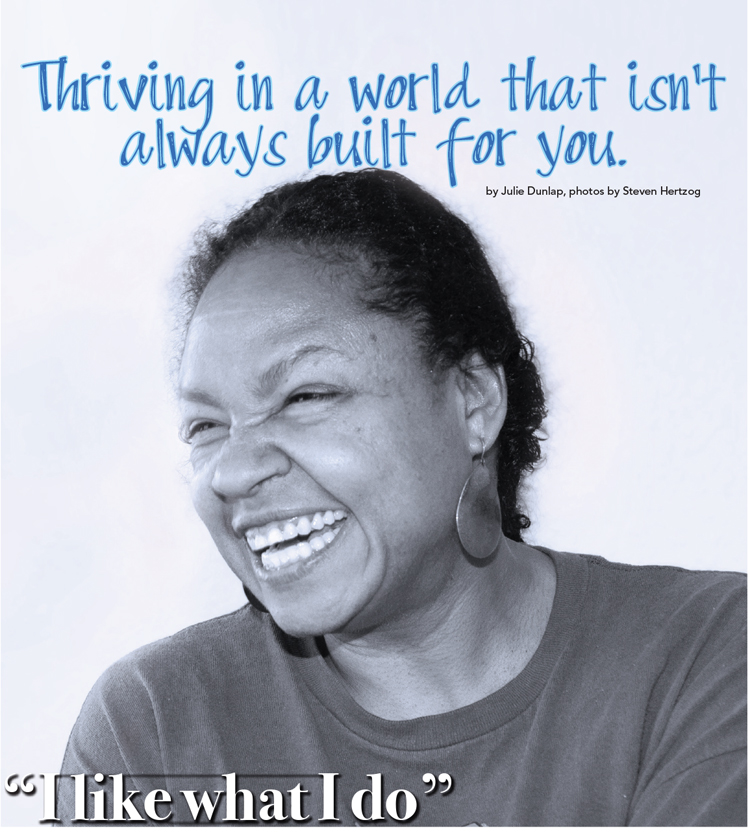
Lisa Boulton
“I like what I do”
Spend ten minutes with Lisa Boulton, and the world seems brighter.
Boulton is a client served by Cottonwood, Inc., an outreach and care organization for people with intellectual disabilities, and has been lighting up the workplace for nearly three decades, including the past 20 years at the University of Kansas’s Lewis Hall dining room, Mrs. E’s.
“I’ve worked in cafeterias most of my life,” says Boulton of her tenure, adding with a beaming smile, “I like what I do. It’s something I’ve always liked.”
She begins a typical work day on a bus to Daisy Hill’s main dining hall, arriving early enough for the breakfast shift to make sure the coffee is ready, napkin dispensers are filled, and the salt and pepper shakers are full.
“I like to be there early,” she states. “That job is important, and it’s important for me to be ready and prepared.”
Boulton appreciates the routine of each shift and meeting a new crop of students each year.
“I’m very laid back with [the college students],” she says of her relationship with them. “I’m used to them, and they’re used to me… I call Mrs. E’s my ‘second home.’”
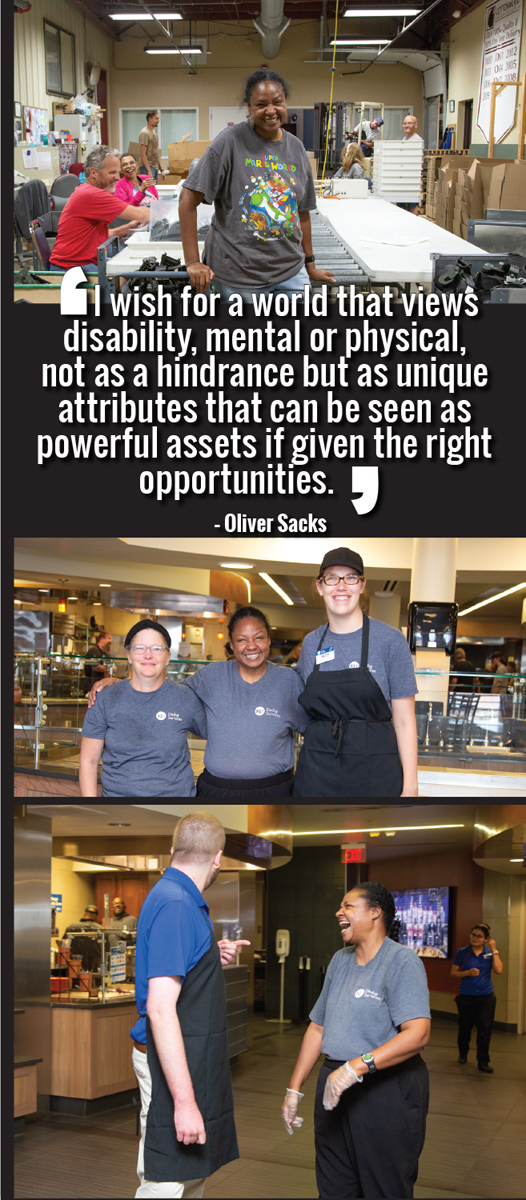
Top to Bottom: Lisa at Cottonwood Inc; Lisa with co-workers Alex Leland and Sherri Hobbs in the cafeteria at Mrs. E’s; Lisa laughs it up with Lead Supervisor Jason Pattison at Mrs. E’s
When school is not in session, Boulton works for Cottonwood Industries, a division of Cottonwood, Inc., which offers bulk mailing, commercial sewing, packaging, and manufacturing and assembly services for companies around the area and across the country, including producing cargo tie-down straps for the United States Department of Defense.
The importance of this work is not lost on Boulton, who humbly takes pride in her part of our nation’s military operations, saying, “I know what I’m doing, and it’s very impressive.”
Boulton is one of roughly 120 clients served by Cottonwood, Inc., and one of nearly 240 people currently employed through Cottonwood, Inc.’s JobLink program. More than 200 businesses of all sizes in the Lawrence area hire JobLink employees each year.
“We have really good loyalty from these employees,” says Ken Sarber, Director of Education and Learning Services at LMH Health. “They strive to do a great job, and that makes a big difference these days.”
LMH Health was named JobLink’s 2018 Outstanding Employer of the Year, a partnership they value and encourage other employers to consider as well.
“Keep a very open mind,” Sarber advises, noting the job coaches at JobLink work hard to match the right employees with the right jobs. “Every applicant from JobLink has a unique skill.”
“It’s all about the relationships we build with employers and our applicants,” says Phil Bentzinger, director of JobLink at Cottonwood, Inc., adding, “the applicants we have are people who want to work.”
Any job-seeker who has experienced a barrier to employment is encouraged to apply with JobLink. The program has filled more than 3,000 jobs in its 35 years, affecting far more than employees’ bank accounts.
“The power of employment has a diversely positive impact on the lives of all people, while the power of diversity has a needed positive impact on all employers,” Bentzinger says.
Bouton agrees.
“I like what I do, I mean, it’s obvious,” Boulton smiles, recounting not just her time at work, but enjoying the fruits of her labors with regular trips to her favorite store, Claire’s, and outings and vacations through the City of Lawrence Parks and Recreation Department before infectiously adding, “I’m very happy.”
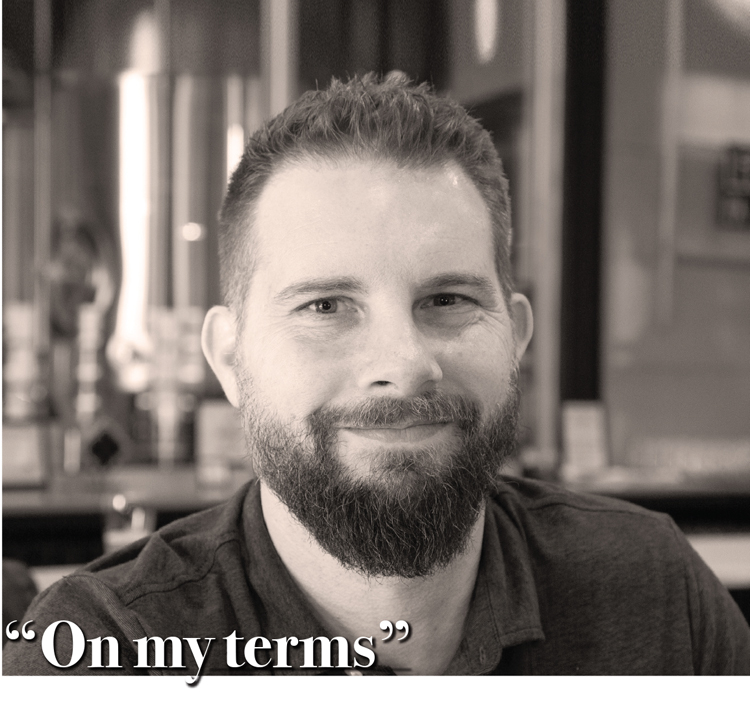
Brendon Allen co-owner the Lawrence Beer Company
“On my terms”
Lawrence Beer Company co-owner and Alarm.com director Brendon Allen has long been an endurance athlete.
An adventurous soul, Allen was completing his MBA in Melbourne, Australia in early 2002 when his leg suddenly gave out while running. He went to the emergency room in Australia and was told he had likely injured a tendon. Weeks later, a second attempt to run brought the same result.
By this time, Allen and his wife were heading back to their home state of Kansas briefly before moving to San Francisco, where a job with Apple awaited. While in Lawrence, he had a local orthopedic surgeon and longtime family friend check out his leg.
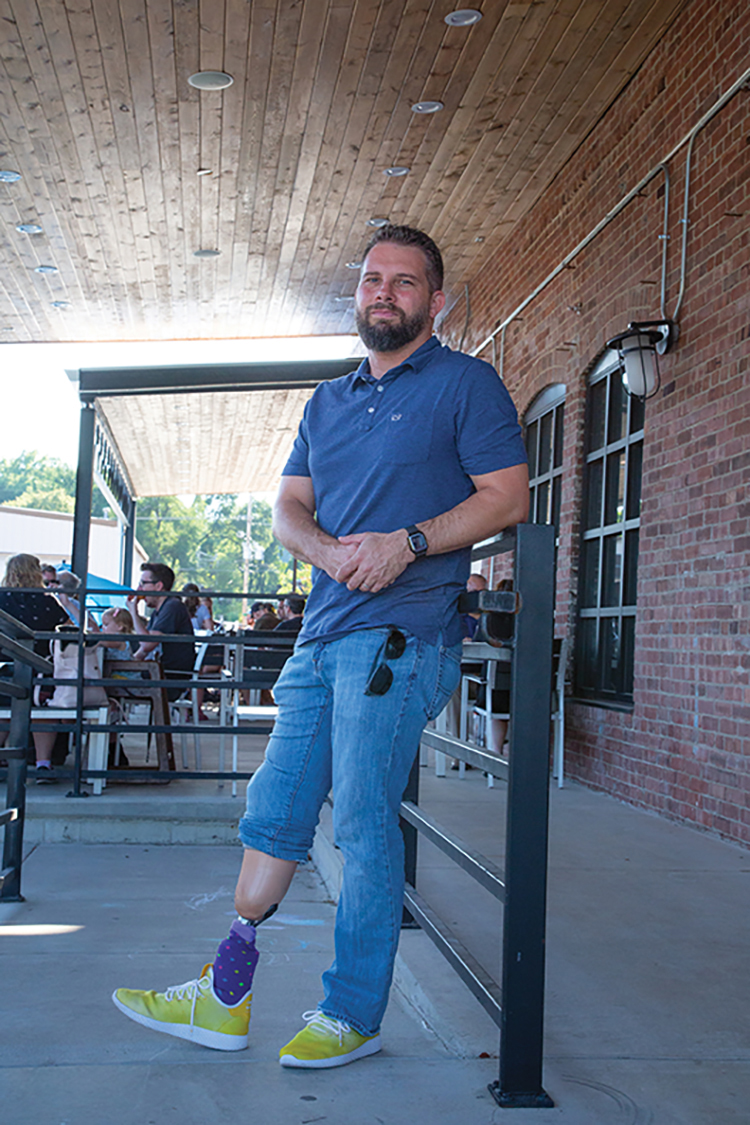
Brendon Allen co-owner the Lawrence Beer Company
Instead of a tendon injury, an x-ray showed a mass in Allen’s lower leg. A biopsy the following day confirmed it was a bone cancer.
“I’ve always been afraid of failing,” Allen says, “but the stakes definitely got a lot higher at that point.”
Allen tried delaying his job with Apple but, a few months in to his 10-month chemotherapy regimen, decided to turn down the position altogether. Another blow came when, after six months of treatment, Allen’s lower leg was amputated.
“I was so done with chemo by then,” Allen recalls, “I was at peace with the decision.”
Allen spent just over one year from his diagnosis undergoing chemotherapy, amputation, physical therapy, and recovery before easing back into work.
“I had interned for a company in Lawrence during college and worked full-time for them after college,” he explains. “I asked them if I could come back for part-time contract work.”
With $125,000 in out-of-pocket medical expenses, getting back to work was as important financially as it was mentally and emotionally.
Allen started slowly, consulting and coding for one client in Atlanta. While Allen had previously trotted the globe with no special accommodations in the past, losing a limb brought a new set of challenges to the traveling tech expert.
“It took 18 months of working with it,” Allen says of learning to walk with a prosthetic leg, “before it became a natural act.”
Navigating airport security, hustling through the Atlanta airport, driving, carrying luggage that changed his center of gravity, all took practice and patience.
Over two million miles in flight, two overseas relocations, and all seven continents later, however, Allen has it down.
Those travels, in fact, helped influence another business venture for Allen. While living in Germany, Allen developed a strong appreciation for good beer.
“I used to home brew, especially after living in Munich,” he says. Home brewing back in Lawrence led him to team up with Matt Williams, Sam McClain, and Ken Baker two years ago to open Lawrence Beer Company at 826 Pennsylvania.
As a business owner, Allen has deeper insight on accessibility for both employees and patrons. He also works very hands-on, not letting his physical limitations get in the way of doing what needs to be done, whether that means carrying supplies from the parking lot into the restaurant or climbing ladders. Employees are often surprised to find out Allen is doing all of this with a prosthetic leg.
“It’s been long enough [since the amputation], I actually forget sometimes,” he laughs. This falls right in line with his driving desire to not let his prosthetic leg be the focus in the workplace, as he emphasizes, “I do it on my terms.”
The path to autonomy and independence has been long but never lonely, a great fortune Allen appreciates.
“The support group I had — my wife, parents, visiting daily,” Allen recalls though a lump in his throat. “Not everyone at the hospital was as lucky as I was.”
Knowing how crucial a support system – including the prosthetist who has fitted him for multiple prosthetic legs – has been to his participation in the world around him, Allen now helps other amputees across the country gain access to opportunities with his work on the board of the Kansas City-based Steps of Faith Foundation.
“I see lots of people like me who just don’t have that one tool,” Allen explains.
Steps of Faith provides prosthetic care for amputees, a vital service for those seeking or continuing employment post-amputation. The foundation, led by Allen’s good friend and fellow amputee, executive director Billy Brimblecom, provided more than 100 prosthetics nationally last year alone, with nearly all recipients able to hold jobs within six months of receiving their new limbs.
All of this is very different from his dream of working in San Francisco for Apple 17 years ago.
“Billy (Brimblecom) and I once asked each other, ‘If we could go back and change it, would we?” Allen muses. “We were surprised the answer was, ‘No.’”
The now-married father of two, living and working in Lawrence adds with a smile, “We realize what’s important.”
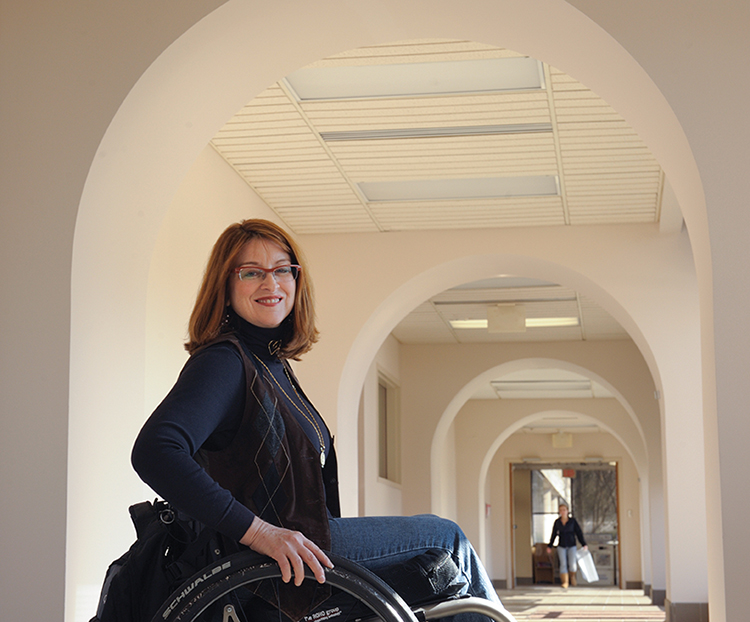
Dorothy E. Nary, Ph.D. – Photo by Cat Rooney.
“Employment is much more than a paycheck”
Dr. Dot Nary, with the Kansas Disability and Health Program, has lived with spina bifida her entire life and has spent the last 33 years living that life to its fullest while in a wheelchair. Nary knows from both her work as a researcher and her own experiences the challenges those with physical and intellectual limitations face in the workplace.
She also knows what overcoming those limitations can mean for a community.
“As more people with disabilities become aware of their rights, advocate for themselves, and gain education and access to employment, we change the community,” Nary explains. “Employment is much more than a paycheck… it is better for all if people with disabilities have opportunities to work.”
These opportunities often depend on simple factors those without disabilities might take for granted, such as reliable transportation or physical access to a work site. In Allen’s case, a prosthetic limb can run tens of thousands of dollars. Nary recently spent $52,000 on a used wheelchair-accessible van for herself, to be able to go to work (non-modified used minivans typically cost closer to $20,000). For someone entering the workforce, these costs can be insurmountable.
Access to healthcare can also limit a person’s ability to work. Steps are being made to assist with this, as Nary explains that Medicaid expansion, available under the Affordable Care Act, has significantly increased employment opportunities for those with disabilities. Unfortunately, Kansas has yet to allow for this expansion.
Organizations such as Cottonwood Inc.’s JobLink Program and Steps of Faith Foundation are available to help. Additionally, Nary recommends consulting with Independence, Inc., the Disability Rights Center of Kansas, Kansas Department of Children and Families, and Minds Matter for assistance.
Nary is hopeful for the continued advancements in employment for those with disabilities but, citing the high rate of unemployment and underemployment notes, “We have a long way to go.”
